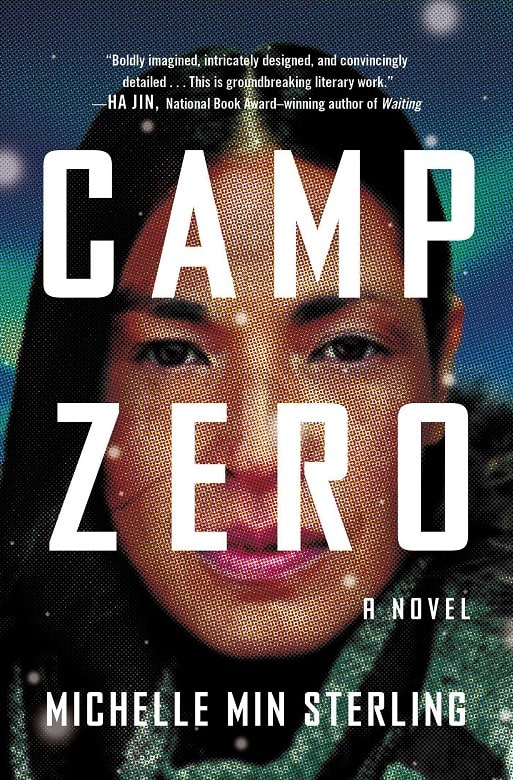The Thing Meets The Handmaid’s Tale: Camp Zero by Michelle Min Sterling
Camp Zero by Michelle Min (Sterling Atria Books, April 4, 2023)
Camp Zero, Michelle Min Sterling’s debut, is a climate change novel that takes place in a near future where only the wealthy can enjoy the best the world has to offer as the temperature and sea levels rise rapidly, forcing them to take refuge in floating cities, virtual worlds, and the great white north.
These wealthy individuals are invading Canada by buying up tracts of land where they can escape the 110-degree (F) average temperatures of places like LA. Meyer, a classic tech-bro architect, has a vision of Camp Zero, a far north city of geodesic domes, and has brought together a team of locals to build it, although that may not be his real agenda. He has also brought in a team of “hostesses,” complete with a madam, to keep the executive staff happy and as occasional treats for the “diggers.” Grant, the camp’s latest hire, is an English teacher fresh out of prestigious Walden University, eager to cut ties with his wealthy family and settle into a quiet academic life surrounded by Nordic furniture and fields of snow.
What he finds is a poorly organized group living in abandoned buildings left over from the now long-outlawed oil boom, and his students are the indifferent diggers, locals with no other prospects. While Grant is a destabilizing influence here, the real story is about the community of women brought here from diverse backgrounds to service the men. Their jobs as prostitutes are not a big deal; more important is the bond they grow between them. Rose, arguably the main character, is actually on a mission to spy for the tech bro that created the flick, the embedded VR device that everyone depends on. Everyone who can get a signal anyway, which does not include anyone in Camp Zero.
There is another group of women in the far north stationed at a radar installation known as White Alice. They are the next rotation after an all-male crew wintered over there with disastrous results. The women of White Alice, on the other hand, revel in the freedom from male posturing and dominance and form a cohesive group much like the prostitutes of Camp Zero.
The two groups will collide, and the author’s issues involving climate change, class, colonialism, and gender identity will come to light. Sterling’s writing is brilliant, but the worn-out world she shows us is all too real and disheartening.
If you are looking for character-driven climate fiction with a heavy feminist slant, you have come to the right place. Camp Zero reads like a mashup of the 1938 John W. Campbell Jr. novella “Who Goes There?”, better known for its movie incarnations as The Thing, with its trapped Antarctic scientists, and Margaret Atwood’s The Handmaid’s Tale (1985). Why this came out after winter was over, I don’t know, but I’m recommending it if you need a dystopian fix with strong feminist themes.
Ernest Lilley is the Editor Emeritus of SFRevu. He edited Future Washington (Prime Books, October 2005), and his blog is being Ernest. His last article for Black Gate was a review of The Terraformers by Annalee Newitz.

“If you are looking for character-driven climate fiction with a heavy feminist slant, you have come to the right place.” Sounds interesting, but not my cup of tea.
Might be a good book, might not. It does seem indicative to me, though, of an increasing trend – writers aiming for an ever-narrower bull’s eye instead of targeting their books broadly, relegating huge numbers of potential readers to the outer rings of the target – or putting them off of it altogether. Writers have a perfect right to do that, of course, just as readers have the sovereign power of “nope.”
That was my thought as well. My guess is that this is a really well-written and interesting book. But that description, again a guess, seems like it would only appeal to a certain swath of audience instead of a wider one. For example, I read Handmaid’s Tale several years ago only knowing it was a dystopian novel, and I loved it. Is it feminist sci-fi? I don’t know, but I probably wouldn’t have picked it up if it had been advertised that way. Not that I avoid feminist literature, there’s just nothing about that moniker that appeals to me. Perhaps I’m a minority data point here though. Perhaps pitched this way really sell well now.
Sounds very interesting to me, tho!
Why do many books today get described as “X meets Y”? I always get put off when I see that, as if something can’t be described as being compared to other things to get you to read them. Anyone who doesn’t like X or Y will certainly not pick up something described as a combination of those things.